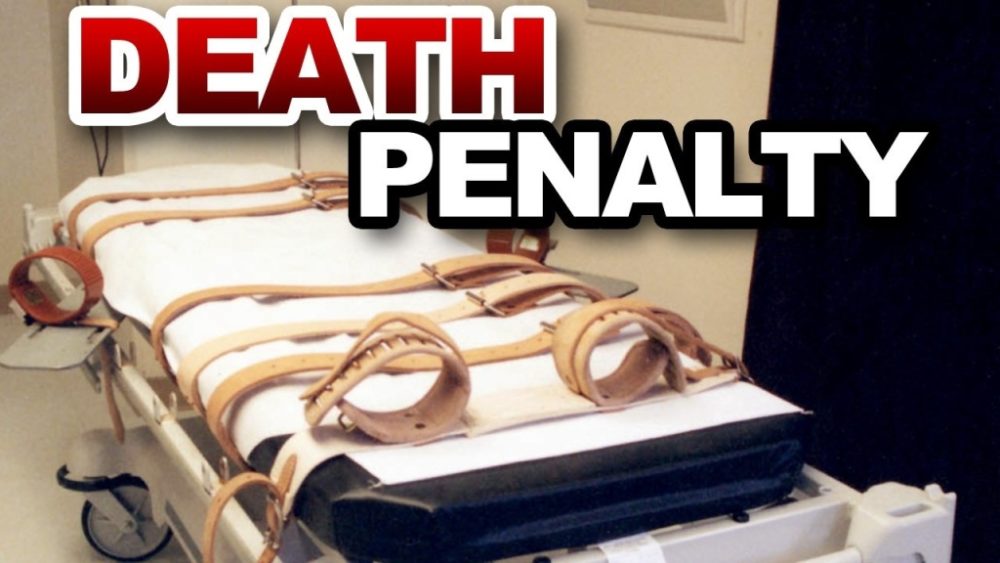New Hampshire Repeals Death Penalty
Last week, New Hampshire became the latest state to repeal the death penalty. Thus becoming the 21st state to do so.

Overriding a veto by the state’s Governor, the New Hampshire legislature has passed into law a bill repealing the state’s death penalty statute:
Lawmakers in New Hampshire voted Thursday to abolish the death penalty, overriding a veto from the state’s Republican governor and making it the 21st state to abandon capital punishment.
The vote by the New Hampshire Senate capped months of uncertainty about what would happen to capital punishment in the state, the last in New England to still have the death penalty.
This debate has been largely symbolic, because New Hampshire has neither an active death penalty system nor any executions on the horizon. The state has only one person on death row — Michael Addison, who was sentenced to death more than a decade ago for killing Michael Briggs, a Manchester police officer — and last carried out an execution in 1939.
Addison also does not face imminent execution, as corrections officials have said they do not have any lethal injection drugs or any plan to get them. The bill debated Thursday was not retroactive, leaving Addison’s sentence in place regardless of what happened.
(…)
Lawmakers in New Hampshire had tried to abolish the death penalty before but narrowly failed, running headlong into gubernatorial vetoes and, in 2014, falling short by a single vote.
After Gov. Chris Sununu (R) vetoed a bill last year abolishing the death penalty, lawmakers passed another measure this year with enough support to withstand a veto.
This bill “changes the penalty for capital murder to life imprisonment without the possibility for parole,” stripping away the possibility of a death sentence for such crimes.
Sununu vetoed the newer bill earlier this month while at a facility named for Briggs and alongside the fallen officer’s relatives, calling it “an injustice” to them, Briggs and other victims of violent crime.
In his veto message to lawmakers, Sununu wrote that “New Hampshire has always shown prudence and responsibility in its application of the death penalty.”
Sununu issued a statement moments after the Thursday vote criticizing the Senate.
“I have consistently stood with law enforcement, families of crime victims, and advocates for justice in opposing a repeal of the death penalty because it is the right thing to do,” he said. “I am incredibly disappointed that the Senate chose to override my veto.”
Sununu’s veto set up a legislative showdown, because overriding it required two-thirds of both the New Hampshire House and Senate. Last week, the New Hampshire House voted to override Sununu’s veto, passing it more narrowly than it had the initial repeal bill months earlier. The bill abolishing the death penalty first passed the House in March by a vote of 279 to 88, while the veto override passed last week by a slimmer 247 to 123 vote.
The measure then went to the smaller Senate, which had, in April, voted 17 to 6 to abolish the death penalty. The veto override Thursday passed the Senate by a vote of 16 to 8.
More from the New Hampshire Union-Leader:
New Hampshire became the 21st state to ban capital punishment on Thursday as the state Senate voted 16-8 to override the governor’s veto of a death-penalty repeal.
Sixteen votes in the 24-member chamber were required to override the veto.
Republican Gov. Chris Sununu, a staunch opponent of repeal, cited law enforcement and families of crime victims in his reaction to the override vote.
“I am incredibly disappointed that the Senate chose to override my veto,” the governor said in a statement.
Democratic state Rep. Renny Cushing of Hampton and members of his family watched the historic vote from the gallery, as death penalty opponents withstood a strong lobbying effort by Sununu and active members of law enforcement throughout the state.
Cushing, whose father was murdered in 1988, has championed repeal of the death penalty in New Hampshire for decades.
“The Senate vote to finally abolish the death penalty in New Hampshire is a remarkable moment in our state’s history,” he said.
The Senate first voted 17-6 on April 11 to pass the repeal measure, HB 455.
Manchester State Sen. Lou D’Allesandro, who was absent for the April 11 vote, has been a consistent supporter of the death penalty and voted Thursday to uphold the veto.
To some extent, this debate in New Hampshire was something of an academic one. For a short period in the early 1970s, there was an effective nationwide moratorium on the use of the death penalty due to the Supreme Court’s decision in the 1972 case Furman v. Georgia in which the Court found that the method for imposing the death penalty in Georgia and most other states were unconstitutionally arbitrary and discriminatory. That decision was effectively overruled four years later in the Supreme Court’s 1976 ruling in Gregg v. Georgia..
Since that time, while capital punishment has been and remains legal in 29 states and the Federal system, it has been utilized in a small handful of states, including Texas, Alabama, Georgia, and Florida. Other states have effective moratoriums in place due to the fact that they are finding it difficult to obtain the drugs necessary to carry out executions by lethal injection. In part, this is due to the fact that many pharmaceutical companies, bowing to public pressure, are declining to sell their products to states where they would be used for executions. Other states have a death penalty on their books but are currently under a moratorium imposed by Governors or by that state’s highest court. Additionally, the number of executions taking place annually has declined over the past decade or more, as has the number of instances where prosecutors actually ask for or seek to carry out a death sentence. Finally, there are those states have kept the penalty on their books but have refrained from utilizing it.
According to statistics from the Death Penalty Information Center, New Hampshire is one of the states that fall into the final category. What these statistics show is that there have been no executions in the Granite state in the 43 years since Gregg was decided. In that sense, this repeal in New Hampshire is something of a symbolic move that simply confirms the fact that the penalty itself is not an option in a state where no executions have been carried out in at least 43 years.
Despite that, it is a positive development for those of us who oppose capital punishment. Indeed, while polling continues to show that most Americans support the death penalty, those numbers are much lower than they used to be and other polling has indicated that, given the choice, the public would support life in prison without parole over the death penalty. This is what the maximum sentence now is in those states that have repealed the death penalty, and it is effectively what that sentence has been in New Hampshire for the past four decades.
The argument that Governor Sununu made in his veto statement is, of course, little more than pure political pandering. Despite the arguments that advocates for capital punishment have made for decades now, there is simply no measurable deterrent effect that can be ascribed to the death penalty. Furthermore, it’s never been clear to me how sentencing someone to death gives any form of closure to the family of a crime victim, especially given the fact that a death sentence inevitably means years of appeals before there is anything approaching a final resolution. Additionally, it has been established in numerous studies that the death penalty actually ends up costing taxpayers more than keeping someone in prison for the rest of their life would cost, so there’s no real fiscal argument that can be made here. Add into all of this the very real risk of mistake, bias, and unfairness, as we’ve seen demonstrated in numerous cases over the years, and the arguments for the death penalty become less and less persuasive. That, it seems, it one of the main reasons why a generally conservative state like New Hampshire was able to this. Hopefully, other states will follow their lead.





“Additionally, it has been established in numerous studies that the death penalty actually ends up costing taxpayers more than keeping someone in prison for the rest of their life would cost”
My guess is that the increased cost is due to the numerous appeals. Some hard-liner will, no doubt, say that if we’d just execute them right away, it’d be cheaper.
“Add into all of this the very real risk of mistake, bias, and unfairness, as we’ve seen demonstrated in numerous cases over the years, and the arguments for the death penalty become less and less persuasive.”
Exactly.
I think in large part the death penalty has become something of a fetish in right wing circles.
Not a sexual fetish, but the original meaning of an object believed to have supernatural powers, or a human-made object that has power over others. Capital punishment is not per se an object, but it’s concrete enough.
Death! Mayhem in the streets!!! More money in the state’s coffers!!!! Wait a minute….
First this is great news — in particular the veto override part.
Agreed, though I fully support these sorts of symbolic moves to take bad/antiquated laws off the books in order to ensure that they are truly gone.
@Kathy:
I won’t say it’s a majority opinion but FWIW I have noticed an increasing number of conservatives who are opposed to the death penalty.
@Kathy: but the original meaning of an object believed to have supernatural powers, or a human-made object that has power over others.
All part of a larger fetish, IMO … closure. Your cousin is murdered? Execute the perp! Instant closure and all is well again.
I was going to ask why, under the circumstances outlined, the veto made any sense at all; then Kathy provided a workable explanation:
Thank you, Kathy. Again, you have enlightened me and brought clarity where confusion and bewilderment had reigned.
As a NH resident, I’d say the veto was likely impacted by the Addison case, which is still fairly fresh in everyone’s mind here–there’s still a tendency towards setting this issue up as a “liberals vs. cops” one–which is ridiculous.
I’m pleased with this veto override, and am happy that NH is no longer the only state in the northeast with this on the books.
Much happiness in SD’s house hold as the spouse has been involved in death penalty repeal fo several years